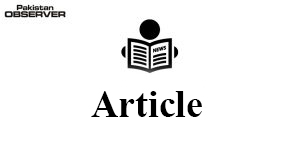Pervaiz Ali Mahesar
THE COVID-19virus has affected almost 1.5 million people around the world. Its epicentre has shifted from China and neighbouring countries to Europe- Italy, Spain, France, and Germany and moving towards the United States. The spread of the virus has indeed exposed nationalistic tendencies in the US and Europe as it was called a “China Virus” by the prominent peoples in the west. However, after containing epidemic domestically, China acted aggressively to control further spread of the virus. After this, China extended its cooperation to the world. As COVID-19 enters its fifth month (December 2019 to April 2020), several themes on China are under discussion among the literary circles, for instance, ‘Chinese Health Silk Road’, ‘Chinese Rail Link to Europe’, ‘Supply Chains’, Global Connectivity’ and Authoritarian Governance’. It would be interesting to see how COVID-19 is shaping Chinese global image. In this section, I analyze how China, in contrast to the US, has responded to epidemic and how scholars view Chinese win over the virus as a catalyst of projecting its soft power in Europe?
Responding to COVID-19 crisis: The Chinese response to COVID-19 crisis was slow in the beginning but later it took radical actions to curb the spread domestically by locking down entire provinces and cities. After overcoming the initial phase of spread, it announced its support for 82 countries in the world. This response is depicted as ‘geopolitical opportunity as well as soft power campaign of China’, for observers like Yu Jie, a senior research fellow at Chatham House, UK. The apparent logic behind the Chinese push for the soft image is that it was previously branded as a ‘strategic rival’, ‘systemic rival’, ‘revisionist power’ and threat to the western world. Therefore, the deconstruction of anti-China notions at regional and global levels seems a point of focus for the Chinese leadership during the current events. It is also expected that the global economic recession would be unavoidable in the post-epidemic scenario in the world. It is almost a universal truth that every crisis favours some and harms others. And given the current events it seems more than likely that China will surely step in. The world has gone through several crises of similar nature in history.
The US, in contrast to China, is dealing with the outbreak slowly but carefully at the domestic front amidst numbers of infected are soaring exponentially with every passing day. Their response to Europe was more likely to be reluctant due to trans-Atlantic rift which already existed in the US-Europe relations. Whereas China offered aid to European countries, the foremost among them were Italy, Spain, and Greece. To deal with the worsening situation of the health system in Europe, the Chinese President talked to Italian and Spanish Premiers and offered China’s assistance. In addition to that, Beijing sent its airplanes loaded with face masks, test kits and ventilators. Chinese cooperation received a mix response in Europe as some viewed it as genuine help whereas others were more sceptical about the motives. Meanwhile, the American response is dubbed as hesitant, lethargic and undecided towards Southern Europe, though a few of their NGOs established their camp hospitals, for example in Lombardy. What came as a surprise for many European countries was the delay in aid by their most trusted and seasoned ally – the US whereas their unconventional partners like China, Russia and Cuba were extending them helping hand. This might leave a negative message for American allies in other regions like the Middle East, Central Asia, South Asia and Southeast Asia. If we look a few years back, we would know that China has invested heavily in Portugal, Rome and Greece. Its investment was largely in sectors like banking, utilities and logistics. Interestingly, Italy was the first among G-7 countries which signed MoU with China in the year 2019. This was more of a hesitant embrace by Italians which received a mix response from its partners. Amid COVID 19 crisis, Italy received very little support from the European Union. It reflects in a survey carried out by Monitor Italia, which shows that 88% of the people in Italy considered that the EU did not help them in the COVID-19 crisis. Whereas, the increasing percentage from 47% to 67% manifested that there is no benefit of being a member of the EU.
Conclusion: Goldman Sachs has reduced its forecast for Global GDP to 1.25% and there is no doubt that the increase in pandemic will disrupt economies. They further add that“COVID-19 could be less severe than the deep recessions of 1981-82 and 2008-09, but worse than the mild recessions of 1991 and 2001”. With the well-crafted approach, China is repositioning itself in the wake of the COVID-19 crisis, both at domestic and global levels. It proved itself to be a responsible stakeholder rather than a bystander in global affairs. Washington may fall behind Beijing on issues like climate and epidemics and the US doesn’t have a long-term strategy to either engage or compete with China. He claims that unless they have better economic, social and ecological models, they may not win from China in the long run. Politically, there are chances that America will shift the entire blame of its failures on China. Hence, Sino-phobia could be created in the West as it is showing early signs of hate crimes against Chinese individuals. It would be interesting to see how China works to counter this threat to their soft image. I believe that China will have more leverage in Europe since the trade is already tilted in favour of the former and COVID-19 crisis brings new opportunities to project its soft power in Europe.
—The writer teaches at the Department of Political Science, University of Sindh, Jamshoro.










